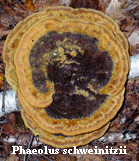|
|
A New England and Eastern Canada Edible and Medicinal Mushroom Resource |
|||||||||||||||||||||||||||||||||||||||||||||||||||||||||||||
Home
Chanterelle (Cantharellus cibarius) Black Trumpet (Craterellus cornucopioides, C. cenerius, C. foetidus) Small Chanterelles (Craterellus tubaeformis, C. ignicolor) Hedgehog (Hydnum repandum, H. umbilicatum) Horse and Meadow Mushroom (Agaricus arvensis, A campestris) Parasol Mushroom (Macrolepiota procera) Shaggy Mane (Coprinus comatus) (White) Matsutake (Tricholoma magnivelare) Blewit (Lepista nuda) Oyster Mushroom (Pleurotus ostreatus, P. populinus)
King Bolete (Boletus edulis) Boletus variipes and other. Two Colored Bolete (Boletus bicolor) Maitake (Grifola frondosa) Chicken of the Woods (Laetiporus sulphureus) Dryads Saddle (Polyporus squamosus)
Morels (Morchella esculenta, M. elata) Puffballs (Calvatia gigantea, Calvatia cyathiformis, others) Lobster Mushroom (Hypomyces lactifluorum) Aborted Entoloma (Entoloma abortivum)
Medicinal Mushrooms Maitake (Grifola frondosa) Reishi (Ganoderma tsugae, G. lucidum) Turkey Tail (Trametes versicolor) Chaga (Inonotus obliquus) Artist's Conk (Ganoderma applanatum)
Collecting, Photographing and
Cooking Collecting
Tips Evaluating
Flavor Dyeing Fabrics and Paper with Mushrooms
|
Dyeing with Mushrooms
Many mushrooms may be used to dye wool, some fabrics and other fibers. Paper can be made from some mushrooms and mushroom papers can be dyed with other mushrooms for a unique, textured, colored, paper suitable for art applications. Until recently I was only aware of a few species that were useful for these applications. This past summer I attended the 2007 NEMF Annual Samuel Ristich Foray at the University of Maine in Orono. There I witnessed a truly beautiful display of dyed wool made by Anne Williams of Stonington Maine. Anne has been experimenting with mushrooms as dyes for years and the results of her efforts are truly impressive. She uses many mushrooms no one else seems to use and has dyed wool with dozens of species. I would have eaten the chanterelles but she makes nice yellow wool with them. She had dozens of different colored wools on display that were labeled with the types of mushrooms and mordants/modifiers she used. Simple natural mordants/modifiers like salt water, vinegar, ammonia, a copper pot, and a rusty iron pot are used. For 4-5 oz. of wool, up to half of a plastic shopping bag of mushrooms is generally required. About 12 oz. or more of mushrooms per 4 oz. of wool is a good way to measure (3 to 1). An alkaline solution is best in most cases. When using ammonia, about one cup per 4 oz. of wool should be used (2 to 1). Dye makers polypore (Phaeolus schweinitzii) and lobster mushrooms (Hypomyces lactifluorum) can be used in smaller quantities. Dyes can be made with the mushrooms you find that are not edible, slightly gone by, or wormy. This can add a new dimension to your collecting. Below is a chart of mushroom species, mordants/modifiers, and results of Anne's work in dyeing wool.
Use of this site will constitute your acceptance of the disclaimer. Copyright 2011 Mushroom-Collecting.com. All rights reserved. |
